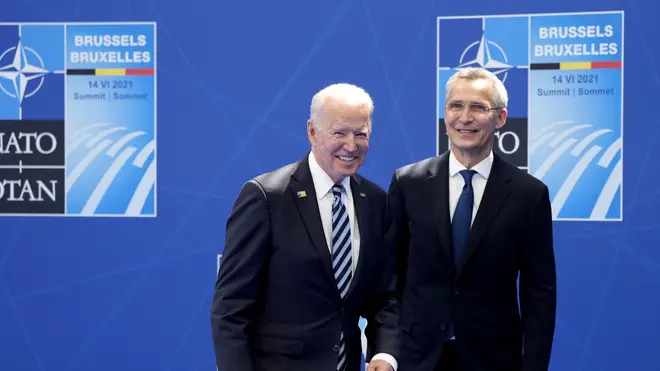
Simon Marks 4pm - 7pm
14 June 2021, 16:44

The US president’s tone was in sharp contrast to his predecessor Donald Trump.
President Joe Biden has reaffirmed the US commitment to Nato after his predecessor Donald Trump questioned the organisation’s relevance.
Shortly after arriving at the alliance’s headquarters for the first Nato summit of his presidency, Mr Biden sat down with Nato secretary general Jens Stoltenberg and underscored the US commitment to Article 5 of the alliance charter, which spells out that an attack on one member is an attack on all and is to be met with a collective response.
Mr Biden said: “Article 5 we take as a sacred obligation. I want Nato to know America is there.”
Our NATO Alliance is stronger than ever. Today I’m joining our 29 allies to discuss our collective defense — including from Russian aggression, strategic challenges from China, malicious cyber activity, terrorism, and climate change.
— President Biden (@POTUS) June 14, 2021
It was a sharp shift in tone from the past four years, when Mr Trump called the alliance “obsolete” and complained that it allowed for “global freeloading” countries to spend less on military defence at the expense of the US.
Looking forward, Mr Stoltenberg noted myriad challenges still facing the alliance.
He said: “We are meeting at the pivotal time for our alliance, the time of growing geopolitical competition, regional instability, terrorism, cyber attacks and climate change. No nation and no continent can deal with these challenges alone. But Europe and North America are not alone.”
Mr Biden, who came to Brussels following three days of consultations with G7 leaders in England, was greeted by fellow leaders with warmth and even some relief.
Belgian Prime Minister Alexander de Croo said Mr Biden’s presence “emphasizes the renewal of the transatlantic partnership”. Mr de Croo said Nato allies were looking to get beyond four stormy years under the Trump administration and infighting among member countries.
“I think now we are ready to turn the page,” Mr de Croo said.
Great to welcome @POTUS to our #NATOSummit . I thanked him for his rock solid commitment to our Alliance & his support for the #NATO2030 agenda to strengthen our Alliance in a more competitive world. I know we can count on America & America can count on #NATO . pic.twitter.com/FAVJDZJytq
— Jens Stoltenberg (@jensstoltenberg) June 14, 2021
Italian Prime Minister Mario Draghi made a not-so-subtle dig at Mr Trump, while welcoming Mr Biden.
“This summit is a continuation of yesterday’s G7 and is part of the process of reaffirming, of rebuilding the fundamental alliances of the United States that had been weakened by the previous administration,” he said. “Think that President Biden’s first visit is to Europe and try to remember where President Trump’s first visit was?”
Mr Trump’s first overseas visit as president was to Saudi Arabia.
Mr Trump routinely berated other Nato countries for not spending enough on defence and even threatened to pull the US out of the world’s biggest security organisation and even questioned the mutual defence provision of the Nato charter, a central tenet of the alliance.
When alliance members last met for a summit in England in December 2019, Mr Trump grabbed headlines by calling Canadian Prime Minister Justin Trudeau “two-faced” and French President Emmanuel Macron “nasty”.

Mr Trump lashed out after Mr Trudeau was caught on a hot mic gossiping with other leaders about Mr Trump turning photo opportunities into long news conferences. Ahead of the summit, Mr Macron had declared Nato “brain dead” because of a void in US leadership under Mr Trump.
The White House said the communique to be signed by alliance members at the end of the Nato summit is expected to include language about updating Article 5 to include major cyber attacks – a matter of growing concern amid a series of hacks targeting the US government and businesses around the globe by Russia-based hackers.
The update will spell out that if an alliance member needs technical or intelligence support in response to a cyber attack, it would be able to invoke the mutual defence provision to receive assistance, according to White House national security adviser Jake Sullivan.